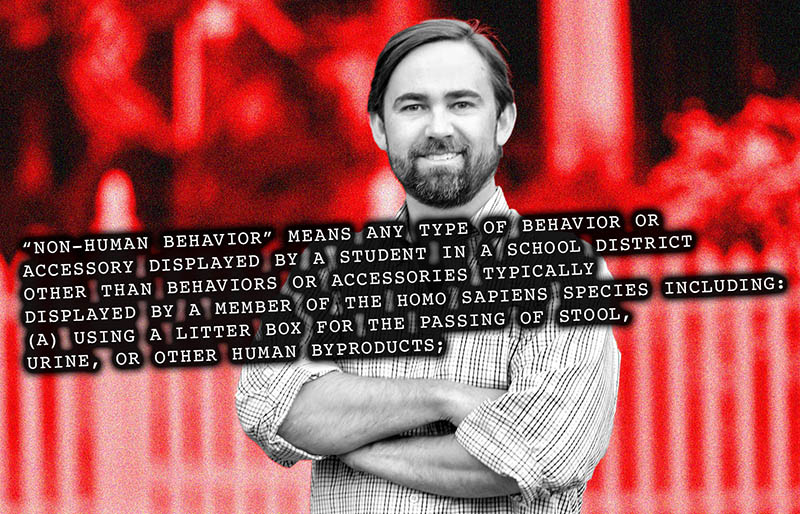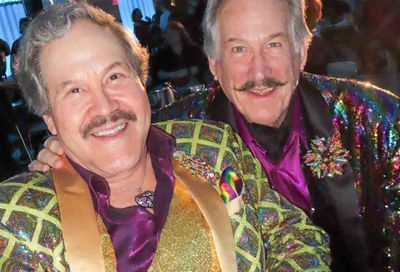The Riley Roundup: Gay Author Blasts Media Coverage of Burning Man
Gay author criticizes media coverage of Burning Man, while a new survey suggests Americans may be souring on transgender rights.

ANTI-BURNING MAN BIAS?
Last week, out gay Pulitzer Prize-winning author Andrew Sean Greer took to Instagram to slam the mainstream media’s coverage of the annual Burning Man event, in which tens of thousands of attendees were stranded after heavy rain turned the festival grounds in Nevada’s Black Rock Desert into a muddy morass.
At least one death was reported, but it is unknown whether it was related to the weather conditions.
Media reports focused heavily on the amount of trash and debris left in the desert, including some vehicles that had to be abandoned when they got stuck in mud, and claimed that participants were “lashing out at each other” due to being stranded in the desert.
While festival organizers criticized outlets like the The New York Times and The Washington Post for what appeared to be alarmist-style coverage of the inclement weather and the complicated logistics of getting people to leave the desert, Greer, who was in attendance, accused those same outlets of not sufficiently sourcing their stories about the festival and relying on rumors from unreliable sources.
“Oh hi there. Just got back from Burning Man and learned that I escaped a cannibal ketamine EDM mud cult,” Greer said in his Instagram video. “Thank god, cause I sure didn’t know that when I was there! I was drinking tequila with my camp and singing musicals, but it sounds like I got it wrong? Or maybe the New York Times and the Washington Post did?”
Greer added, “Look, I know the only story right now is that San Francisco is in a doom spiral and Burning Man was a fiasco and we are somehow both dirty hippies and tech billionaires and deserve to die, and it is such a fun story, but it is not true.”
Greer also rejected reports that attendees were told to ration food and disputed that Burning Man is a “festival.”
“It’s an event of radical self-reliance, meaning we were all always prepared for anything to happen. We bring all of our own food, our own booze, our own supplies and water, and we bring them out. That was actually the hard part: figuring out how to bring out all the ‘grey water’ on Monday when I left — the water from washing and showering, because we leave nothing out there, not even our dirty water. Know what? We got it out with help from our neighbors.”
Taking aim at those who described Burning Man as a “disaster” or “fiasco,” Greer concluded, “It was a little touch-and-go there for a minute, but we prevailed, and I am so sorry that the rest of the world can’t bear to look at people who find joy even in hardship. But if you can, consider that you can too. And maybe you should come to Burning Man next year. If you do, I’ll be there serving bacon and Bloody Marys and I’ll see ya out there.”
ERASING TRANS PEOPLE IN KANSAS
Late last month, a federal judge approved a request from Kansas Republican Attorney General Kris Kobach to block Kansas officials from changing transgender people’s birth certificates to reflect their gender identities, based on a new state law rolling back transgender rights.
The law makes Kansas the fourth state, after Montana, Oklahoma, and Tennessee, to restrict such gender-marker changes on vital documents.
Under the law, a person’s gender is binary and fixed from the moment of birth, based on a person’s “biological reproductive system,” and applies those definitions to all state laws and regulations. The law was approved by the Republican-dominated state legislature, which overrode a veto by Democratic Gov. Laura Kelly.
However, Kelly had announced, before the law took effect, that, based on legal advice from state attorneys, officials could continue changing people’s gender markers on their birth certificates, reports PBS. A separate but similar lawsuit, filed in response to the law, is being waged over attempts to block local DMV offices from changing the gender on people’s driver’s licenses.
While the judge agreed to modify a previous consent agreement allowing transgender residents to change the gender marker on their birth certificates, he said it will ultimately be up to state courts — not federal ones — to decide whether the law is constitutional or not.
Supporters of the law say that birth certificates and state IDs should reflect a person’s assigned sex at birth, in order to protect people’s privacy and safety by ensuring that single-sex facilities are only used by people of the biological sex for which they are designated. Opponents claim the law violates transgender people’s constitutional rights and puts them at risk of violence when their IDs unintentionally “out” them as transgender.
Omar Gonazlez-Pagan, an attorney with Lambda Legal, blasted the law as unconstitutional, saying: “Access to accurate identity documents is vital; without accurate identity documents, transgender people face even greater threats of discrimination, harassment, and even violence.”
AMERICANS SOURING ON TRANS RIGHTS?
A recent survey conducted in three southwestern and western states claims that residents of Texas, Arizona, and even liberal-leaning California are not as open to embracing expanded rights for transgender and gender-nonconforming individuals.
The poll was conducted by researchers at the University of Houston Hobby School of Public Affairs, Arizona State University, Stanford University’s Bill Lane Center for the American West, and the Stanford Institute for Economic Policy Research (SIEPR), surveying more than 1,000 people over age 18 in each of the three states between May 31 and June 6. The poll asked people about their opinions focusing on transgender bathroom usage, transgender participation in sports, and the availability of gender-affirming medical interventions for minors. The margin of error is plus or minus 3 percent.
According to the poll, a majority of Texans (61%) and Arizonans (54%) believe that transgender people should be forced to use bathrooms that only match their assigned sex at birth, while 45% of Californians believe transgender people should be allowed to choose which restroom to use based on their gender identity.
Meanwhile, when it comes to sports, majorities of respondents in all three states support barring transgender women and girls from participating in female-designated sports. When it comes to barring transgender youth from accessing gender-affirming care, 53% of Texans, 51% of Arizonans, and 41% of Californians support blocking minors from receiving such treatments.
The survey found that respondents who regularly attend religious services are more likely to favor restrictions on transgender rights and transgender visibility regarding those three issues. It also found that a substantial number of self-identified Democrats were opposed to more lenient laws allowing transgender people to access facilities, single-sex spaces, and services based on their gender identity — further increasing those in favor of bathroom bans, sports bans, and gender-affirming care bans.
Researchers say more information on attitudes toward transgender rights is needed before any long-term conclusions can be drawn. “The issues we examine in this survey might long hold true for the majority opinion. Or they may be one point along the road to equal treatment that many groups continue to travel,” David Brady, a senior fellow at Stanford University’s Hoover Institution and SIEPR, said in a statement. “It is for the future to reveal.”
Support Metro Weekly’s Journalism
These are challenging times for news organizations. And yet it’s crucial we stay active and provide vital resources and information to both our local readers and the world. So won’t you please take a moment and consider supporting Metro Weekly with a membership? For as little as $5 a month, you can help ensure Metro Weekly magazine and MetroWeekly.com remain free, viable resources as we provide the best, most diverse, culturally-resonant LGBTQ coverage in both the D.C. region and around the world. Memberships come with exclusive perks and discounts, your own personal digital delivery of each week’s magazine (and an archive), access to our Member's Lounge when it launches this fall, and exclusive members-only items like Metro Weekly Membership Mugs and Tote Bags! Check out all our membership levels here and please join us today!

























You must be logged in to post a comment.